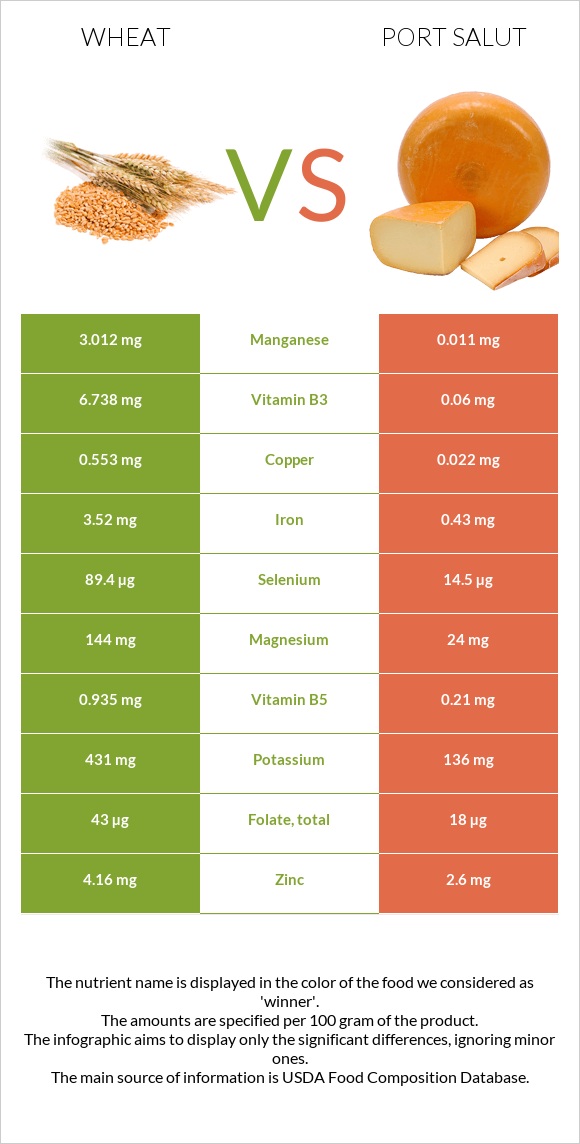Wheat vs. Port Salut — In-Depth Nutrition Comparison
Compare
Significant differences between wheat and port Salut
- Wheat has more selenium, manganese, copper, vitamin B3, iron, and vitamin B1; however, port Salut is richer in vitamin B12 and calcium.
- Wheat covers your daily selenium needs 136% more than port Salut.
- Port Salut has 274 times less manganese than wheat . Wheat has 3.012mg of manganese, while port Salut has 0.011mg.
- Wheat contains less saturated fat.
- Wheat has a higher glycemic index. The glycemic index of wheat is 50, while the glycemic index of port Salut is 27.
Specific food types used in this comparison are Wheat, durum and Cheese, port de salut.
Infographic

Infographic link
Mineral Comparison
Mineral comparison score is based on the number of minerals by which one or the other food is richer. The "coverage" charts below show how much of the daily needs can be covered by 300 grams of the food.
| Contains more MagnesiumMagnesium | +500% |
| Contains more PotassiumPotassium | +216.9% |
| Contains more IronIron | +718.6% |
| Contains more CopperCopper | +2413.6% |
| Contains more ZincZinc | +60% |
| Contains more PhosphorusPhosphorus | +41.1% |
| Contains less SodiumSodium | -99.6% |
| Contains more ManganeseManganese | +27281.8% |
| Contains more SeleniumSelenium | +516.6% |
| Contains more CalciumCalcium | +1811.8% |
Vitamin Comparison
Vitamin comparison score is based on the number of vitamins by which one or the other food is richer. The "coverage" charts below show how much of the daily needs can be covered by 300 grams of the food.
| Contains more Vitamin B1Vitamin B1 | +2892.9% |
| Contains more Vitamin B3Vitamin B3 | +11130% |
| Contains more Vitamin B5Vitamin B5 | +345.2% |
| Contains more Vitamin B6Vitamin B6 | +690.6% |
| Contains more FolateFolate | +138.9% |
| Contains more Vitamin AVitamin A | +∞% |
| Contains more Vitamin DVitamin D | +∞% |
| Contains more Vitamin B2Vitamin B2 | +98.3% |
| Contains more Vitamin B12Vitamin B12 | +∞% |
All nutrients comparison - raw data values
| Nutrient |  |
 |
DV% diff. |
| Selenium | 89.4µg | 14.5µg | 136% |
| Manganese | 3.012mg | 0.011mg | 130% |
| Saturated fat | 0.454g | 16.691g | 74% |
| Vitamin B12 | 0µg | 1.5µg | 63% |
| Calcium | 34mg | 650mg | 62% |
| Copper | 0.553mg | 0.022mg | 59% |
| Vitamin B3 | 6.738mg | 0.06mg | 42% |
| Cholesterol | 0mg | 123mg | 41% |
| Fats | 2.47g | 28.2g | 40% |
| Iron | 3.52mg | 0.43mg | 39% |
| Vitamin A | 0µg | 315µg | 35% |
| Vitamin B1 | 0.419mg | 0.014mg | 34% |
| Magnesium | 144mg | 24mg | 29% |
| Vitamin B6 | 0.419mg | 0.053mg | 28% |
| Carbs | 71.13g | 0.57g | 24% |
| Sodium | 2mg | 534mg | 23% |
| Monounsaturated fat | 0.344g | 9.338g | 22% |
| Phosphorus | 508mg | 360mg | 21% |
| Protein | 13.68g | 23.78g | 20% |
| Vitamin B5 | 0.935mg | 0.21mg | 15% |
| Zinc | 4.16mg | 2.6mg | 14% |
| Potassium | 431mg | 136mg | 9% |
| Vitamin B2 | 0.121mg | 0.24mg | 9% |
| Folate | 43µg | 18µg | 6% |
| Vitamin D | 0 IU | 21 IU | 3% |
| Vitamin D | 0µg | 0.5µg | 3% |
| Choline | 15.4mg | 3% | |
| Vitamin E | 0.24mg | 2% | |
| Vitamin K | 2.4µg | 2% | |
| Polyunsaturated fat | 0.978g | 0.729g | 2% |
| Calories | 339kcal | 352kcal | 1% |
| Net carbs | 71.13g | 0.57g | N/A |
| Sugar | 0.57g | N/A | |
| Tryptophan | 0.176mg | 0.343mg | 0% |
| Threonine | 0.366mg | 0.876mg | 0% |
| Isoleucine | 0.533mg | 1.446mg | 0% |
| Leucine | 0.934mg | 2.482mg | 0% |
| Lysine | 0.303mg | 1.987mg | 0% |
| Methionine | 0.221mg | 0.734mg | 0% |
| Phenylalanine | 0.681mg | 1.323mg | 0% |
| Valine | 0.594mg | 1.707mg | 0% |
| Histidine | 0.322mg | 0.686mg | 0% |
Macronutrient Comparison
Macronutrient breakdown side-by-side comparison
Protein:
13.68 g
Fats:
2.47 g
Carbs:
71.13 g
Water:
10.94 g
Other:
1.78 g
Protein:
23.78 g
Fats:
28.2 g
Carbs:
0.57 g
Water:
45.45 g
Other:
2 g
| Contains more CarbsCarbs | +12378.9% |
| Contains more ProteinProtein | +73.8% |
| Contains more FatsFats | +1041.7% |
| Contains more WaterWater | +315.4% |
| Contains more OtherOther | +12.4% |
Fat Type Comparison
Fat type breakdown side-by-side comparison
Saturated fat:
Sat. Fat
0.454 g
Monounsaturated fat:
Mono. Fat
0.344 g
Polyunsaturated fat:
Poly. Fat
0.978 g
Saturated fat:
Sat. Fat
16.691 g
Monounsaturated fat:
Mono. Fat
9.338 g
Polyunsaturated fat:
Poly. Fat
0.729 g
| Contains less Sat. FatSaturated fat | -97.3% |
| Contains more Poly. FatPolyunsaturated fat | +34.2% |
| Contains more Mono. FatMonounsaturated fat | +2614.5% |